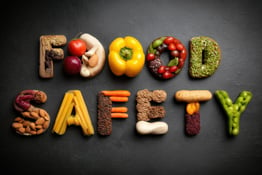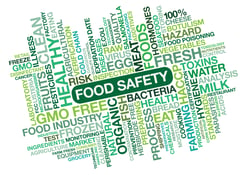Foodborne illness outbreaks are a nightmare for any restaurant. One incident can tarnish your brand's reputation, erode the trust you’ve worked to build with your consumers, and, in the worst-case scenario, lead to severe illness or even death. These risks were thrust into the spotlight by two recent high-profile incidents.
In late October, McDonald's announced that it was dealing with an E. coli outbreak tied to the slivered onions used in its hamburgers. The outbreak led to over 100 reported illnesses and one fatality. In the immediate aftermath, the fast-food chain’s sales and traffic both took a major hit.
The challenges faced by McDonald’s are hardly unique to the fast-food sector. A month later, Grimmway Farms, a California-based supplier of organic produce, recalled carrots contaminated with E. coli. This outbreak also caused one fatality and dozens of reported illnesses.
These incidents should serve as a wake-up call for restaurants in every lane of the industry. The specter of foodborne illness is always present in this business. Indeed, we are beholden to strict food safety protocols for good reason. As restaurant owners, operators, and employees, we all have a serious responsibility to help protect the public health.
So how, as a restaurant owner, can you be sure that your operation is living up to this responsibility?
Foodborne Illness: The #1 Risk in a Risky Business
Operating a restaurant is inherently risky. In addition to dealing with the day-to-day challenges of fierce competition, razor-thin profit margins, and high employee turnover, restaurateurs also face the very real threat of foodborne illness. According to the U.S. Centers for Disease Control and Prevention (CDC), more than 48 million Americans suffer from some type of foodborne illness every year, resulting in an estimated 128,000 hospitalizations and 3,000 deaths.
This translates to a major risk factor for restaurants. The immediate harm that foodborne illness can cause to customers is obviously paramount. But for restaurants, the financial, operational, and reputational damage that can result from such incidents can also be devastating.
An established brand like McDonald’s may be able to weather the storm–though it bears noting that the company has invested $100 million into its brand rehabilitation effort. But for a restaurant with neither the established customer base nor the capital for a massive PR campaign, a single outbreak may cause irreparable harm to the brand.
“Smaller restaurants rely on customer trust and word of mouth,” Stephanie Wethington, general manager of Trust20, told us. “One report of a foodborne illness on social media can be devastating to a small business owner.”
Fortunately, restaurants are not defenseless against this threat.
Food Safety Protocols: Your Restaurant's First Line of Defense
Following proper food safety protocols is more than just a way to remain compliant with the rules. It’s also your first line of defense against spoilage, contamination, and foodborne illness.
An effective food safety program will include strict policies and procedures for:
- Food supplier management
- Product quality control
- Proper storage practices
- Food preparation and cooking temperatures
- Proper food handling procedures
- Personal hygiene, handwashing, and use of protective equipment (i.e., gloves, hairnets, etc.)
- Regular cleaning and sanitizing of kitchen surfaces, utensils, and equipment
Food Safety Training: Key to Preventing Foodborne Illness
A food safety program that incorporates all of these elements can help safeguard against foodborne illness outbreaks. But an effective program requires both comprehensive and ongoing training.
Food safety training programs can provide your employees with the knowledge and skills needed to follow protocol; adhere to current rules and regulations; identify and address potential food safety risks; and earn certification in specific areas of food safety practice.
Training programs should cover:
- Foodborne pathogens and their role in illness outbreaks
- Proper handling, storage, and preparation of food to minimize the risk of contamination
- Proper sanitation procedures for prep and cook surfaces, utensils, and equipment
- First aid procedures in the event of kitchen-related accidents, injuries, or illness
- Appropriate procedures in the event of foodborne illness complaints and outbreaks, including steps for reporting incidents to health authorities and taking corrective actions
- Proper hygiene standards, including handwashing, glove use, and prevention of cross-contamination
“We encourage restaurants to set a schedule for employee training,” said Wethington. “While it is crucial to the onboarding process, it is just as important to provide refresher training and ensure people are always up to date with the latest in food safety science–not to mention staying in compliance with state and local training and certification requirements.”
Learning From Recent High-Profile Incidents
The McDonald’s and Grimmway Farms outbreaks demonstrate not only the importance of supplier management and quality control, but also the importance of responding to incidents with swift and transparent action.
McDonald’s moved quickly to change its onion supplier, announced a public recall, and launched a public relations campaign aimed at rebuilding trust with customers. Grimmway Farms issued a voluntary recall of all organic carrots produced during the period in question, suspended production at the farms traced to the bacterial exposure, and is working closely with the CDC and FDA to identify the initial cause of the contamination.
These responses highlight the importance of not just preventing foodborne illnesses but also having a plan in place for managing the fallout in the unfortunate event that an outbreak does occur. Restaurants that fail to respond quickly and transparently risk incurring far greater damage to their reputation and bottom line.
“Planning ahead and being proactive are key,” said Wethington. “The responses to recent high-profile incidents were able to move so quickly because there was already a response plan in place. While we all hope they never have to be used, restaurants should ensure they have a recall plan in place and a schedule for reviewing and updating the plan.”
Make Sure Your Staff is Food Safety Certified
Of course, the greatest offense is a strong defense. The most important lesson we can take away from both the McDonald’s and Grimmway Farms incidents is that we all share a responsibility to protect public health.
“Operators and managers set the tone for their employees,” Wethington said. “If you prioritize food safety and make sure it stays top of mind for your team, you will build a culture of food safety within your restaurant. Expecting food safety best practices to be standard operating procedure emphasizes to employees that shortcuts simply are not worth it.”
Make sure your team is able to take on the responsibility of maintaining industry-leading food safety training. Not sure where to start? Trust20 is an ANSI National Accreditation Board (ANAB)-accredited provider of food safety education and testing throughout the U.S. Enlist your team for training and certification in food handling, food allergies, food protection, and more.





